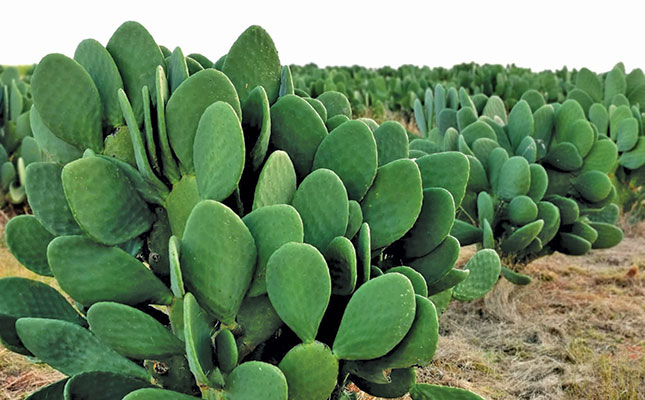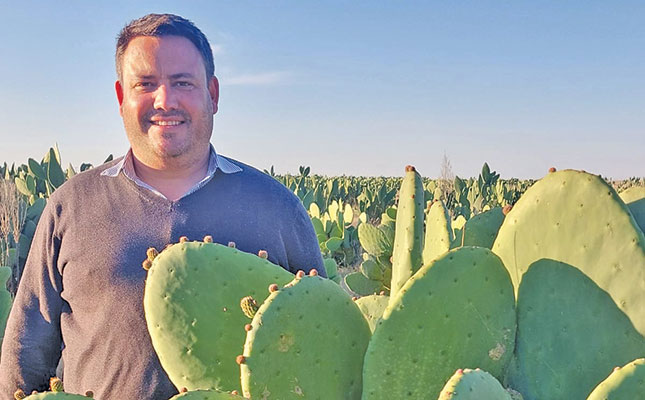Probably the most essential choices the Van der Berg brothers ever made was to incorporate the manufacturing of cactus pear of their farming operation. Dewald van der Berg spoke to Annelie Coleman about their enterprise.

Picture: Witkraal Farming
Dewald van der Berg and his two brothers, Rudolf and Christof, have a combined farming operation on the farm Witkraal, close to Petrusburg within the Free State, which they took over three years in the past after the loss of life of their father. Whereas all three are part-time farmers, Van der Berg is in command of operating the household enterprise, Witkraal Farming.
He’s satisfied that making cactus pear manufacturing a part of their operation as an extra supply of revenue was one in all their greatest choices.
In response to him, the brothers first realised the worth of cactus pear manufacturing about 12 years in the past.

“We have been drawn to this crop due to the truth that it might be planted within the semi-arid Petrusburg space underneath dryland circumstances.
“After we first began rising cactus pear, the plan was to supply cactus pear oil, in addition to cladodes as fodder for livestock herds on the farm. Nonetheless, through the years the enterprise advanced in such a means that Witkraal Farming now concentrates totally on cladode manufacturing,” explains Van der Berg. (Cladodes are modified stems that resemble and performance as leaves.)
The farm has 70ha of established cactus pear orchards, with one other 30ha planted earlier this 12 months. On the time of Farmer’s Weekly’s go to, an extra 30ha have been being ready for planting later within the 12 months.
The purpose is to supply disease-free cladodes of the best high quality for patrons and potential shoppers. At present, 16 cultivars are grown on the farm, of which 10 are being evaluated to see how they fare underneath native circumstances.
Van der Berg says numerous these varieties present promise, however it’s nonetheless too early to gauge precisely.
“One selection specifically, which I came across on a farm within the jap Free State, could also be a totally new selection, with fruit that ripens very late within the season. I’m very enthusiastic about it, however we first want to judge it underneath native circumstances to verify it has the qualities that we hope it does,” he says.
Commercially obtainable cultivars
Six of their varieties are commercially obtainable at current; they’re Morado, Meyers, Algerian, R1259, Skinners Courtroom and Gymno Carpo. Van der Berg describes Morado as an all-rounder for oil and fodder manufacturing, and says it produces excessive volumes of good-quality fruit and cladodes. He provides that the Algerian can be a wonderful alternative, with massive portions of fruit and cladodes. The flesh of the fruit is a gorgeous pink-red color and fairly tasty.
Nonetheless, in accordance with him, the fruit of Skinners Courtroom is the very best of all; a green-fleshed selection, it affords wonderful style and texture.
The brothers sourced their first plant materials from the now late Danie van Tonder, who farmed on Waterkloof close to Bloemfontein, and his son DF van Tonder, who now runs the farm. Waterkloof was additionally dwelling to trials performed by the College of the Free State on greater than 40 types of cactus pear.
Planting good cladodes
On Witkraal, cladodes are planted by hand, and the typical crop yields between 70t and 100t of moist materials. In response to Van der Berg, the perfect cladodes for planting are a minimum of a 12 months previous. By this stage they’ve reached maturity and have the capability to retailer adequate water reserves, thereby growing their resistance to frost.
No less than 30cm of topsoil is required, and whereas most of South Africa’s soil varieties are appropriate for cactus pear manufacturing, good drainage is important. As Van der Berg places it, the vegetation “don’t like having moist toes”. Briefly, he stresses, the higher the soil, the higher the vegetation will carry out.
The cladodes are planted at 2,5m intervals in ripped rows 5m aside, which permits tractors and different equipment to be manoeuvred simply between them. Plant density is 800 vegetation/ha.
Though the timber solely attain full maturity about 4 years after planting, they start to bear a small harvest inside 18 months.
“Some producers keep a distance of 2m between the vegetation. They nonetheless do effectively, however we desire to make use of 2,5m, because it makes it simpler for us to prune and examine the vegetation for pests and ailments,” says Van der Berg.
Orchard administration
Cactus pears have extraordinarily excessive warmth and drought tolerance. They will additionally endure excessive rainfall, supplied they’re planted in well-drained soil. The vegetation are proof against chilly temperatures, though younger vegetation are pretty delicate to frost.
In response to Van der Berg, the vegetation fare effectively within the central components of South Africa, and he considers the local weather and rainfall in Petrusburg to be excellent for manufacturing.
It’s a fallacy that cactus pear orchards don’t want a lot administration due to the vegetation’ hardiness and adaptableness, he provides. The orchards must be cleared of weeds and inspected for pests regularly. The vegetation require fertiliser at planting, and yearly thereafter earlier than the beginning of the brand new rising season.
“We usually fertilise our vegetation every year in late spring, simply earlier than the primary rain. They reply effectively to nitrogen, so we use a nitrogen-rich fertiliser at about 200g to 250g per grownup plant, which we unfold on the base. Nonetheless, we’re within the technique of reviewing our present fertilisation practices because of the steep rise in fertiliser costs,” he says.
Pests
Cladode manufacturing is labour-intensive, and pruning and harvesting are carried out manually. Van der Berg avoids utilizing chemical compounds to deal with pests and ailments, as patrons are proof against this sort of administration.
The 2 principal pests on Witkraal are cochineal (Dactylopius coccus) and the cactus moth (Cactoblastis cactorum), and the orchards are inspected as soon as a month by a body of workers. Cochineal outbreaks have been lowered to the naked minimal, and will a number of of those scale bugs be noticed, they’re merely killed by hand.
“This may increasingly sound primitive, however as a result of we’ve adopted this observe for numerous years, we’ve managed to just about remove the cochineal risk. We undergo the orchards very often to make sure that new populations [of cochineal] don’t get an opportunity to ascertain themselves,” he says.
Van der Berg provides that whereas cactus moth is barely trickier to regulate, they merely minimize off all the contaminated cladodes and feed them to their livestock.
“We’ve additionally put in electrical insect traps in orchards the place electrical energy is offered, and this has performed an enormous function in lowering cactus moth populations.”
The timber are pruned in the direction of the top of winter, with all the surplus cladodes being eliminated manually utilizing handsaws.
Advertising
Witkraal Farming markets its cladodes on its web site, by way of social and print media, and most significantly, by phrase of mouth.
“A very powerful advertising and marketing software is offering each consumer with high quality plant materials in an effort to keep the great title we’ve constructed up through the years,” says Van der Berg.
Witkraal has supplied plant materials to growers from the Western Cape, Limpopo and Botswana, and their typical shoppers are industrial producers who’re on the lookout for new alternatives to diversify their farming companies.
Van der Berg emphasises the truth that cactus pear manufacturing is a useful choice for diversification. For farmers who have already got entry to recent produce markets, cactus pear supplies them with a chance to market much more recent produce.
Livestock farmers, alternatively, can develop cactus pear to be used as a extremely nutritious supply of animal feed.
Electronic mail Dewald van der Berg at [email protected]. Go to witkraal.co.za.




